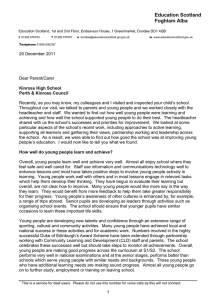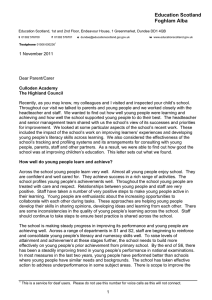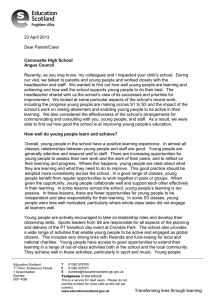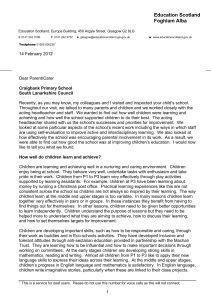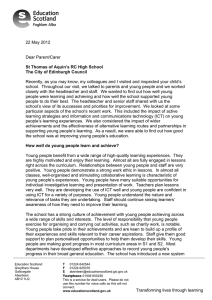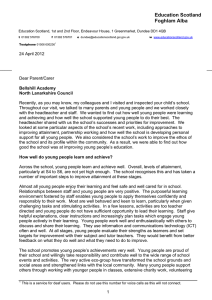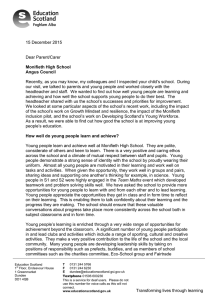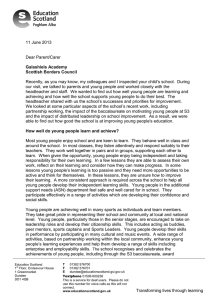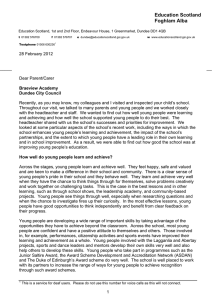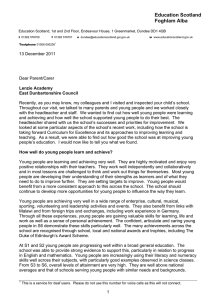Education Scotland Foghlam Alba
advertisement
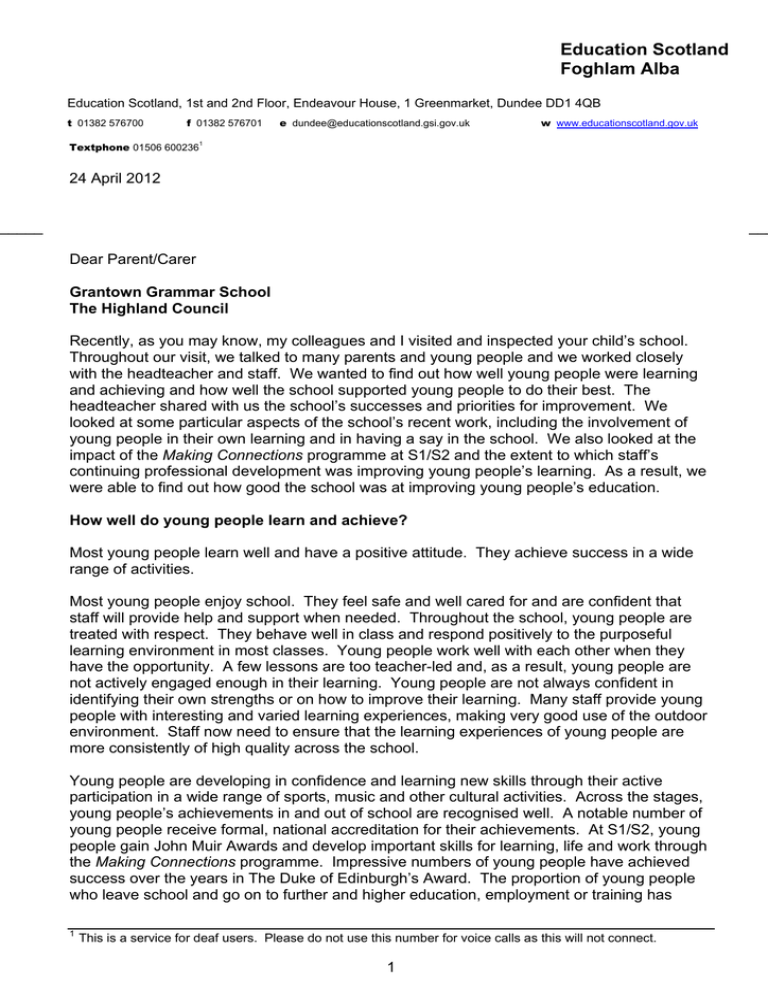
Education Scotland Foghlam Alba Education Scotland, 1st and 2nd Floor, Endeavour House, 1 Greenmarket, Dundee DD1 4QB t 01382 576700 f 01382 576701 Textphone 01506 600236 e dundee@educationscotland.gsi.gov.uk w www.educationscotland.gov.uk 1 24 April 2012 _____ ___ Dear Parent/Carer Grantown Grammar School The Highland Council Recently, as you may know, my colleagues and I visited and inspected your child’s school. Throughout our visit, we talked to many parents and young people and we worked closely with the headteacher and staff. We wanted to find out how well young people were learning and achieving and how well the school supported young people to do their best. The headteacher shared with us the school’s successes and priorities for improvement. We looked at some particular aspects of the school’s recent work, including the involvement of young people in their own learning and in having a say in the school. We also looked at the impact of the Making Connections programme at S1/S2 and the extent to which staff’s continuing professional development was improving young people’s learning. As a result, we were able to find out how good the school was at improving young people’s education. How well do young people learn and achieve? Most young people learn well and have a positive attitude. They achieve success in a wide range of activities. Most young people enjoy school. They feel safe and well cared for and are confident that staff will provide help and support when needed. Throughout the school, young people are treated with respect. They behave well in class and respond positively to the purposeful learning environment in most classes. Young people work well with each other when they have the opportunity. A few lessons are too teacher-led and, as a result, young people are not actively engaged enough in their learning. Young people are not always confident in identifying their own strengths or on how to improve their learning. Many staff provide young people with interesting and varied learning experiences, making very good use of the outdoor environment. Staff now need to ensure that the learning experiences of young people are more consistently of high quality across the school. Young people are developing in confidence and learning new skills through their active participation in a wide range of sports, music and other cultural activities. Across the stages, young people’s achievements in and out of school are recognised well. A notable number of young people receive formal, national accreditation for their achievements. At S1/S2, young people gain John Muir Awards and develop important skills for learning, life and work through the Making Connections programme. Impressive numbers of young people have achieved success over the years in The Duke of Edinburgh’s Award. The proportion of young people who leave school and go on to further and higher education, employment or training has 1 This is a service for deaf users. Please do not use this number for voice calls as this will not connect. 1 improved notably over recent years. The attainment of young people at S4 is, overall, in line with national averages. However, young people at S4 do not attain as highly as pupils in schools which serve young people with similar needs and backgrounds. At S5/S6, young people’s attainment is mostly in line with, or above, schools serving young people with similar needs and backgrounds and national averages. Staff recognise that they need to improve the proportion of young people who achieve success in several subjects at Higher level. How well does the school support young people to develop and learn? The school meets the needs of young people well. Arrangements for meeting the needs of young people who require additional support are very strong. The curriculum provides most young people with a broad range of subjects and opportunities. In the majority of lessons, staff provide young people with a wide range of appropriate tasks and activities. In these lessons, young people engage enthusiastically in their learning. In some lessons, however, activities do not provide young people with sufficient challenge. Almost all staff know young people well and the school has effective arrangements for identifying any additional learning needs of young people. Staff are very caring and committed to young people’s welfare. Support staff, including learning assistants, provide very strong support for young people in classes. Young people with additional needs are well-supported in moving from P7 into S1. Staff work very well with a wide range of local employers and partners to support young people, including those with additional support needs, on leaving school. Overall, the curriculum provides young people with a broad range of learning experiences. Recent innovations to the curriculum, including enhancing the outdoor learning programme, help young people to develop their awareness of the local environment. Local partners make a positive contribution to the curriculum. At S1/S2, teachers have improved courses to involve young people more in their learning, for example, by working cooperatively in groups. Staff now need to ensure that plans to improve the curriculum at S3, providing all young people with a broad learning experience, are agreed and implemented. At S3 to S6, young people experience a broad range of courses and have appropriate opportunities to learn some important skills for work. Staff should continue to develop approaches for promoting young people’s skills in literacy and numeracy across subjects. Across the stages, young people respond well to opportunities to learn more about the importance of sustainability and becoming global citizens. Staff should develop more consistent approaches to ensuring that all young people build effectively on their earlier learning at primary school. How well does the school improve the quality of its work? The school’s approaches to self-evaluation and planning improvements need to be improved. Staff are motivated and committed to providing young people with positive learning experiences. They value the headteacher’s support and consultative approach. Most staff are reflective and many work well in small groups to share good practice in their teaching. In a few departments, staff monitor the learning and progress of young people well. Overall, arrangements to analyse and improve young people’s performance in national examinations are too variable and do not lead to clear priorities for improvement. There are no consistent approaches to monitoring and improving the quality of young people’s learning experiences and attainment across the school. Staff should improve arrangements for gathering, and acting on, the views of young people and parents. Senior staff need to introduce clear and consistent approaches to self-evaluation across the school. In doing this, they should develop and share higher expectations, building on existing good practice within the school. 2 This inspection of your school found the following key strengths. • • • • Young people’s achievements in a wide range of activities. The use of the local environment, outdoor learning and partnerships to enhance young people’s experiences. The support given to young people with additional support needs. The positive impact of the dedicated staff on outcomes for young people. We discussed with staff and the education authority how they might continue to improve the school. This is what we agreed with them. • • • Improve arrangements for involving young people in monitoring their progress and achievements more systematically to ensure they know how to improve their learning. Continue to develop the curriculum in line with Curriculum for Excellence to ensure that young people achieve the best they can. Develop approaches to self-evaluation across the school to improve the consistency of the quality of young people’s learning. What happens at the end of the inspection? We are satisfied with the overall quality of provision. With support from the local authority and Education Scotland, the school will be able to make the necessary improvements. Our District Inspector, along with the local authority, will discuss the most appropriate support in order to build capacity for improvement and will maintain contact to monitor progress. Parents will be informed by the local authority of the extent to which the school has improved. Alistair Brown HM Inspector Additional inspection evidence, such as details of the quality indicator evaluations, for your school can be found on the Education Scotland website at http://www.hmie.gov.uk/ViewEstablishment.aspx?id=8863&type=3. Please contact us if you want to know how to get the report in a different format, for example, in a translation. You can contact us at enquiries@educationscotland.gsi.gov.uk or write to us at BMCT, Education Scotland, Denholm House, Almondvale Business Park, Almondvale Way, Livingston EH54 6GA. If you want to give us feedback or make a complaint about our work, please contact 01506 600200, or write to us at the above address or e-mail: feedback@educationscotland.gsi.gov.uk. 3
